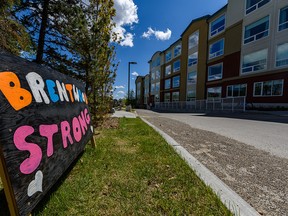
Article content
Laundry and housekeeping staff at three Calgary long-term care centres will have their hours reduced, says the union representing the workers.
Advertisement
This advertisement has not loaded yet, but your article continues below.
Article content
The Canadian Union of Public Employees Alberta said more than 75 part-time employees and 41 full-time employees at Chinook Care Centre, Southwood Care Centre and Brentwood Care Centre will be losing hours, said a news release from the union. CUPE Alberta president Rory Gill said the cuts were mostly in housekeeping and laundry staff while a booking clerk would also be losing work.
“We’re in a pandemic; it’s essential that things be kept clean,” said Gill. “If you reduce the amount of time that people can spend on basic housekeeping, you are probably going to increase the chance of infection.”
Intercare Corporate Group Inc., operator of the facilities, said it is reducing shifts longer than four hours for housekeeping and laundry staff by 15 minutes per shift and one booking clerk position would be eliminated.
Advertisement
This advertisement has not loaded yet, but your article continues below.
Article content
“Due to unprecedented inflationary pressure and limited increase to the monthly accommodation fee, that is set by the provincial government to help offset these pressures, Intercare is reducing the shifts of employees in housekeeping and laundry that are greater than four hours in length,” said Ian Woodcock, executive vice-president and chief operating officer.
He said the positions are not directly funded by the provincial government in the way that care staff are. He said there is no reduction in resident or patient care staffing.
However, Gill argued that the provincial government, through its funding decisions, has made it impossible for the operator to keep current staffing levels.
“I think the current model of service delivery in long-term care is just totally flawed and can’t go for it. Long-term care should be part of the public health-care system in Canada,” said Gill.
Advertisement
This advertisement has not loaded yet, but your article continues below.
Article content
“What is the provider supposed to do if they don’t have money? Right? I mean, you know, they’ve got shareholders. Again, I think it’s crazy that you have for-profit in this sector, but the government says it’s gonna work. Well, they have to provide the funding.”
Steve Buick, press secretary for Health Minister Jason Copping, said the changes being made have nothing to do with government funding but are decisions made by the operator to manage cost pressures in services that are client-funded.
“Client charges are capped by government policy. If CUPE is suggesting the cap should be raised, they should say so,” said Buick. “Alberta’s government has supported continuing care providers from the start of the pandemic, and the operators and staff deserve credit for doing their best to provide safe care to residents under the extraordinary stress of the pandemic.”
Advertisement
This advertisement has not loaded yet, but your article continues below.
Article content
The reductions in long-term care are coming amid a growing wave of COVID-19 cases that is fuelled by the highly infectious Omicron variant. Several jurisdictions, including Alberta, have reduced isolation times and in part to ensure that there is not a shortage of staff in critical industries.
Fully immunized Albertans who test positive for COVID-19 are currently required to isolate for five days, which is down from a previous 10-day period. Copping previously said exemptions could be made for workers whose absence from work could cause a significant public health impact.






More Stories
How to Create the Perfect Housekeeping Schedule
Must-Have Housekeeping Supplies for Every Household
Top Natural Cleaning Products for a Healthier Home